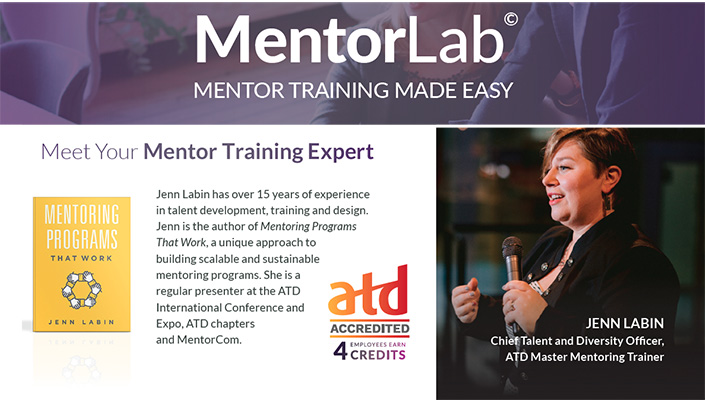Great employees and leaders do not always equal great mentors. Even the most successful employees need guidance and training to become successful mentors. As they launch new programs and work 1-on-1 with their customer success coaches, companies in our mentoring community often find that mentors who are appropriately trained are more engaged and inspired in their mentoring relationship. That’s why mentor training is one of the often-overlooked secrets to great mentorship and successful programs. It’s certainly not the only trick in the book for successful talent development leaders and program admins, but the correlation is strong.
If you ask mentoring veterans, you’ll find they all value training. That begs some important questions you probably have lingering:
- Why do mentors need training?
- What goes into a mentor training program?
- When should my mentors get trained?
- How do I assess whether that training has been effective?
This post will help answer all of those questions for you. And since we know it’s of value to you, we’ve included a free guide on building trust in mentoring relationships.
Take it with you:
Download your free guide to Building Trust in Mentoring Relationships
Why Do Mentors Need Training?
There’s this really great quote from famed astronomer Neil Degrasse Tyson that nicely summarizes the value-add that mentor training provides. In an interview with the organization PETA, Tyson stated:
“Humans aren’t as good as we should be in our capacity to empathize with feelings and thoughts of others… So maybe part of our formal education should be training in empathy. Imagine how different the world would be if, in fact, that were ‘reading, writing, arithmetic, empathy.’”
Empathy is at the very heart of every successful mentoring relationship. The dynamic that you establish in a mentoring program typically involves a mentor guiding a mentee through that mentee’s personal and professional development. That’s hard to accomplish when the mentor fails to understand the pain points that exist for the mentee and when that mentor can’t effectively step into the shoes of the mentee and empathize with that path toward development.
This is why effective mentoring always begins at the match. When mentors and mentees are properly matched based on multiple personality factors and other criteria, they’re far more likely to have meaningful engagements. But just being well-matched doesn’t mean the mentoring relationship is automatically going to succeed. The quality of the engagement still matters, and that quality is significantly enhanced when the mentor is trained on how to serve in that capacity.
What Skills Do Mentors Need to Learn?
We distilled the critical skills that mentors need to create quality conversations that enhance their mentees and help them learn. The following six skills will equip your mentors with the tools, ideas, and intentionality to master the art of mentoring and increase positive outcomes for their mentees.
A successful mentor needs to be able to:
- Quickly build trust
- Set expectations and boundaries
- Create realistic developmental goals
- Adapt their communication
- Celebrate accomplishments
- Maintain learning momentum

At first glance, this may seem like overly basic information. Many mentors will say that they already possess these skills. There is often a disconnect between a mentor thinking they have the skill and effectively using the skill with the mentee.
For example, let’s look at ‘building trust.’ Pretty much any mentor we talk to will say that they are trustworthy. While this is undoubtedly true, this declaration does not directly translate to the mentee automatically trusting their mentor. Rather than just telling your mentors to build trust, you should help them understand how to actually do that by educating them about trust-building behaviors, such as honoring commitments, being fully present during meetings, or maintaining positive body language.
Skills like these will help the mentor build rapport with the mentee, enabling them to learn and grow. They will also help the pair alleviate some of those awkward feelings during the first meeting.
Another situation to consider is when it comes to setting developmental goals. Many mentors are already versed in setting SMART goals and may encourage their mentees to do the same. However, this may not be helpful, especially if the mentee does not know how to set these goals themselves.
Equipping the mentor with the tools to guide the mentee when setting vision-focused goals gently will help in this situation. When goals are…
- Vision-focused
- Driven by the mentee
- Descriptive
- Built on performance or behaviors
- Set up as attainable milestones
…they are more likely to be achieved and behavior changed permanently. In this case, the mentor is helping to provide the why and the how behind a goal, which sets the relationship up for success.
These are just a few of the ways that you can take the six critical skills and help your mentors set up a relationship for success. In the following sections, we’ll dive deeper into strategy and recommendations on how to build out your training.
A Mentor Training Program Starts at the Outcome
Mentor training can be as brief or extensive as you need it to be. Ultimately, all mentor training programs should be constructed in reverse. E.g., you design your program around the outcome you need. I realize that may sound odd. Typically, we think of construction as starting from the foundation and not the Pedagogically, this is called “planning with the end in mind,” or the backward classroom design.
Ironically enough, it’s almost equivalent to teaching to the test, which has understandably taken a lot of heat in recent years. But “teaching to the test” is just backward classroom design; it’s just the “test” that people have issues with, not necessarily the conceptual structure.
From a mentor training standpoint, that backward design means you start by considering what you want your mentors to be able to do at the end of the training program. This can include (but is not limited to):
- Empathy and emotional intelligence: This is the end goal for mentor training as a whole, but it’s important to teach it, especially as it relates to different contexts and relationships, such as through a DEI lens.
- Effective communication: Many new and returning mentors may need assistance developing the type of communication skills that are prerequisites for successful mentoring.
- Goal-setting guidance: Many mentors need to develop proficiency in helping mentees set realistic, achievable goals and create action plans to reach them.
- Conflict resolution: During a mentoring relationship, conflicts and disagreements can happen. Mentors should have the training to manage and resolve conflicts between themselves or, in the case of group mentoring, between other mentees.
- Feedback delivery: Feedback is the lifeblood of mentoring. Mentors must have the skills to provide constructive, actionable feedback to mentees in a way that encourages growth.
- Technical proficiency: Sometimes, you just need to get the basics out of the way. That could include training mentors on how to use the mentoring software platform to maximize their relationship success.
- Data-driven decision-making: Some mentoring programs are set up in such a way that the mentor is responsible for looking at and analyzing data as it relates to their mentee’s growth and then responding to that data. Many mentees may be unfamiliar with effective data gathering, analysis, and usage strategies and may need some training on that end.
- Ethical conduct: All mentors, regardless of the program, should be trained in ethical conduct. A mentoring agreement is necessary on this end to set the ground rules for engagement (you can find the free template in that link, too). A strong understanding and adherence to ethical guidelines like confidentiality and integrity within the mentor-mentee relationship is not something every mentor understands at the outset, and it should be something they’re trained on.
Create Intentionality in Your Program Design

Intentional mentor training will hone the behaviors that create a successful mentoring relationship and increase your mentors’ effectiveness. This provides a positive feedback loop between the mentor, mentee, and organizational goals. When mentors are effective in the relationship, mentees can achieve their goals and accomplish more. Hopefully, they, too, will want to be a mentor in the future.
Also, when your mentees accomplish more, your program reputation will increase, and your organization will see an increase in positive end results. This will help you continue to support a long-lasting and scalable program with sustainable wins for your organization.
Intentionality is not just a concept. It’s something you can build into the program design by following a few simple steps.
To create intentionality in your mentor training program, complete the following steps.
1. Survey mentors to gauge previous experience
Your first step should be to survey potential mentors about their mentoring experience. Taking this action helps you understand the existing skill set and knowledge base of your mentoring pool (both existing and potential).
Knowing what your mentors already bring to the table can guide you in creating a training program that builds upon their strengths and addresses their weaknesses. Additionally, by categorizing mentors into different experience levels, you can offer more targeted training that meets mentors where they are rather than providing a one-size-fits-all approach.
Given the fact that mentoring is all about personalization, it’s certainly on brand for your program to make sure your mentors get as much personalized growth and development as possible!
Recommended experience levels
Your survey should be designed to group your mentors into different experience levels. That grouping is something you can determine within your team, but here’s a recommendation:
- New: Mentors who have little to no prior experience in a mentorship role
- Intermediate: Mentors who have some mentoring experience, possibly in informal settings, and a basic understanding of effective mentorship principles
- Experienced: Mentors who have significant experience in mentorship roles and are familiar with best practices
Survey structure to differentiate experience levels
To distinguish between these levels, the survey could include questions such as:
- How many mentorship programs have you participated in previously?
- On a scale of 1-5, how comfortable are you with setting mentorship goals?
- Have you ever been trained in effective communication techniques for mentoring?
- Describe a challenging mentoring situation you have faced and how you resolved it. (This could be optional for those identifying as ‘New’).
These questions can help you differentiate mentors into the recommended experience categories. For example, those who have never participated in a mentorship program or rated themselves low on goal-setting could be categorized as ‘New.’ Those with some experience and moderate comfort levels in mentorship can be ‘Intermediate,’ and those with extensive experience and high comfort levels can be labeled as ‘Experienced.’
Once you’ve gathered this data, you can tailor your training modules to each group. For instance, ‘New’ mentors may benefit from foundational training on the basics of effective mentorship, while ‘Experienced’ mentors might focus on advanced techniques like conflict resolution and data-driven decision-making.
2. Have mentors take a brief self-assessment tied to your desired learning outcomes
While a survey focuses on assessing the prior experience and existing skill set of mentors, a self-assessment serves a slightly different purpose.
The self-assessment is designed to understand what the mentors themselves aim to get out of the training program. This is crucial because mentors are more likely to be engaged in a program that aligns with their personal learning objectives. It’s a way of asking, “What do you want to improve upon or learn during this training?”
By tying these self-identified areas for growth to the program’s desired outcomes, you can create a training experience that is mutually beneficial for both the mentors and the organization.
Methods for conducting self-assessment
There are two primary ways you could structure the self-assessment:
- Option-based selection: Provide a list of critical skills or competencies that the mentor training program aims to develop, such as effective communication, conflict resolution, or data-driven decision-making. Ask mentors to select the areas they are most interested in improving or learning about.
- Likert scale evaluation: List the program’s desired outcomes, such as increasing mentee engagement, facilitating career development, or improving mentor-mentee communication. Ask mentors to rate their comfort level or proficiency in each area on a Likert scale from 1 (Not comfortable at all) to 5 (Very comfortable).
The one you land on here may depend on time, resources, and needs. For example, your initial survey may have informed you what type of learning outcomes you need to see for your mentoring program to be successful. Or, you may be continuing and expanding mentoring programs from previous cycles and find that training needs to happen based on what you’ve learned previously.
The most important takeaway here is not to just assume what your mentors need. Data-based decision-making is important in almost all aspects of program design, including deciding on what training needs to happen.
Examples of survey questions:
- “How comfortable are you with helping a mentee set measurable goals?” (Rate 1-5)
- “How proficient do you feel in resolving conflicts between you and your mentee?” (Rate 1-5)
Both methods have their merits. Option-based selection is straightforward and may be quicker for mentors to complete. It can also help you identify clear training modules for mentors based on their selected options. A Likert scale evaluation provides a nuanced understanding of mentors’ comfort levels, which can help you pinpoint specific areas where even ‘Experienced’ mentors might need further development.
By combining the insights from the survey about mentors’ past experiences with the data from the self-assessment about their learning goals, you can create a truly customized, targeted, and effective training program.
3. Develop both whole group and customized training modules around experience levels
In an effective mentor training program, it’s essential to strike a balance between whole-group training and customized training modules.
- Whole-group training ensures that everyone is on the same page regarding organizational goals, policies, and basic mentorship guidelines.
- Customized training, on the other hand, allows mentors to delve into areas specifically relevant to their experience level and learning objectives.
Together, these approaches create a training experience catering to universal and individual needs.
Understandably, you may have too few resources to take an approach that’s this robust. Companies average about 1 talent development leader per 353 employees. If you need to triage appropriately, focusing only on the biggest development needs with a whole-group approach is probably best. Or, you can leverage pre-existing mentor training resources from your mentoring software platform.
We have you covered on that one! Just contact us to hear more about what we’ve got under the hood.
Building on previous steps
The survey and self-assessment steps are invaluable data points for shaping these training modules. The survey tells you where each mentor is starting from, and the self-assessment aligns their personal growth objectives with the program’s desired outcomes. By integrating these insights, you can create a training program that is not only targeted but also deeply engaging for the mentors.
Tips for whole-group training
- Cover the essentials: Identify common foundational areas for all mentors regardless of their experience level. This could include things like an overview of the mentorship program’s mission and structure, ethical guidelines, and basic communication skills.
- Interactive sessions: Incorporate interactive elements like group discussions or case studies that allow mentors to learn from one another’s experiences and perspectives.
- Regular updates: Even ‘Experienced’ mentors can benefit from updates on new tools, resources, or policy changes. Make sure to include these in the whole-group modules to keep everyone up-to-date.
- Available content: Make sure that any content you create is accessible outside of the training sessions. That includes a recording of the training session and even chat logs that could be useful for reviewing online discussions.
Tips for customized training
- Skill-based grouping: Use the experience levels identified in the survey to create sub-groups. Tailor training modules for ‘New,’ ‘Intermediate,’ and ‘Experienced’ mentors, focusing on the skills most relevant to each group.
- Outcome-aligned objectives: Align the customized training modules with the desired learning outcomes identified in the self-assessment. For instance, if many ‘Intermediate’ mentors want to improve their conflict-resolution skills, design a module specifically addressing that.
- Flexible learning paths: Offer multiple training modules for each desired outcome, but at different complexity levels. This way, mentors can choose a path that best aligns with both their experience level and what they aim to learn.
- Feedback loops: Establish a mechanism for mentors to provide feedback on each module. This can help refine the training program to meet mentors’ needs.
By employing both whole-group and customized training modules, you can create a holistic training program that effectively develops mentors’ skills while also aligning with organizational goals and desired outcomes. This not only elevates the quality of mentorship provided but also contributes to a scalable and sustainable mentoring program.
When Should Mentors Get Trained?
Mentors should get trained before they meet with their mentee(s).
If that seems like a deceptively simple answer, it’s because it is one. Of course, training happens before mentors start meeting with mentees. But in the real world, you don’t always have the luxury of that kind of time. So, mentor training should be ongoing. I’ll lean back on the word “triage” here since that’s so often the case for HR and talent development leaders these days.
Your approach should be to consider 3 key points:
1. What’s most important for mentors to learn before they’re matched with and start meeting with mentees?
This is the “must-have” knowledge. Ensure mentors understand the program’s core values, objectives, and structure. Modules on foundational communication skills, navigating DEI-related topics, and ethical guidelines should be non-negotiable at this stage. Training on your mentoring software platform could also fall into this category, ensuring mentors know how to make the most out of the tools available to them.
2. What learning can happen during the program cycles?
Think of this as the “nice-to-have but still essential” stage. Topics might include effective goal-setting techniques or problem-solving frameworks. Because mentors and mentees are actively meeting during this time, mentors can apply what they learn in real time, making the training incredibly effective and contextually relevant.
3. What learning should or can happen between cycles or when mentors are off the current mentoring cycle?
This is the “perfect time for deep dives” stage. Here, mentors might undergo advanced training modules, such as mastering data analytics for tracking mentee progress. As mentors are between cycles, they have time to digest more complex topics and can engage in exercises or workshops that require a larger time commitment.
By identifying the most critical learning objectives for each stage of the mentorship cycle and prioritizing modules accordingly, you can create a dynamic, ongoing training program that adapts to both organizational needs and individual growth paths.
How Do I Assess Learning in a Mentor Training Program?
There are multiple schools of thought on measuring and assessing whether your mentors are effectively trained.
- Mentee surveys: Some may say the only way to assess learning is through feedback surveys from mentees. Are mentees satisfied with their mentoring relationships? If so, that would be a strong indicator that the training was successful. This will especially hold true if you have a cohort of untrained mentors and a cohort of trained mentors that you can analyze side-by-side. Of course, that kind of A/B testing has ethical concerns.
- Pre- and post-training assessments. Pre- and post-assessments are a standard tool for assessing learning. In this scenario, you give mentors an understanding assessment before training, then give them the same assessment after the training session. Do their scores increase? Decrease? Stay the same?
- Key Performance Indicators (KPIs): In a more data-driven approach, you could assess learning by setting specific, measurable KPIs that align with your program’s objectives. For instance, if one of your objectives is to improve mentee retention or performance, then monitoring those metrics pre- and post-training can give you valuable insights. If those KPIs improve significantly after the mentors have been trained, it indicates that the training has been effective.
Which measurement strategy wins out?
The optimal method for assessing learning in your mentor training program likely involves a combination of these approaches. Each has its own advantages and limitations:
- Mentee surveys offer direct feedback but can be subjective and are only truly effective if you have a comparative untrained cohort for A/B testing.
- Pre- and post-assessments are straightforward and can yield quantitative data, but they only measure the knowledge a mentor has and not necessarily how they apply it in practice.
- KPIs provide objective, measurable data but might require a longer time frame to assess the training’s impact accurately.
Given these considerations, a multi-faceted approach would be most beneficial. Use pre- and post-assessments to gauge immediate knowledge gains, but also employ mentee feedback surveys for a qualitative view of how that knowledge is being applied in real-life mentoring situations. Finally, align these with KPI metrics to see if program objectives are being met over time. This comprehensive assessment strategy will give you a well-rounded view, allowing you to continually refine and improve your mentor training program for sustained success.
Training Mentors Doesn’t Need to Be Hard
You can take the easy path or the hard path. The hard path? Building literally everything from scratch. The easy path? Leveraging our mentoring platform to launch, match, measure, and engage your employees. For the busy talent development leader (that’s you), time is everything…or, more specifically, the lack of time to do everything you need or want to do.
MentorcliQ’s platform has multiple ways to get your training needs done, thanks to ready-made training materials and learning resources already available in the platform the moment you sign up. You also gain access to MentorcliQ’s vibrant and growing mentoring community, allowing you to learn tips, tricks, and strategies from expert leaders from across the globe.

Interested in elevating your mentor training? MentorcliQ’s MentorLab is designed and facilitated by Jenn Labin, author of Mentoring Programs That Work and an ATD Master Trainer. Contact MentorcliQ to learn more about MentorcliQ’s mentor training features.




